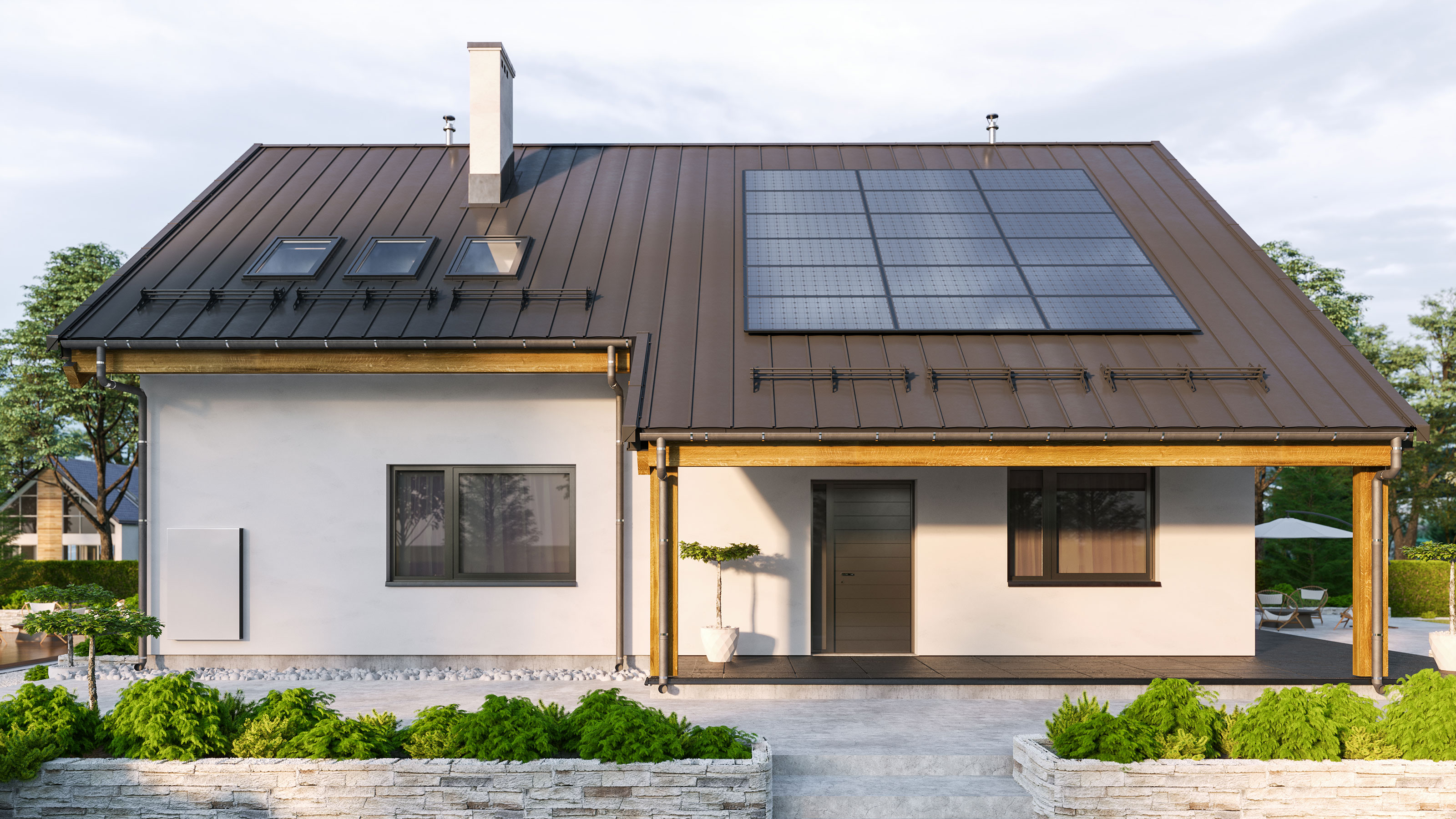How much do solar panels cost to install? Average prices 2022 and why it's worth it
Whether you want to save on your monthly power bill or secure a future with no power outages, the cost of solar panels may well be worth it long-term.


Get small space home decor ideas, celeb inspiration, DIY tips and more, straight to your inbox!
You are now subscribed
Your newsletter sign-up was successful
If you're curious to know how much solar panels cost to install and whether it's worth having the work done to your home, you are not alone. Solar energy is 'booming' in the United States, with an average annual growth rate of 33 percent and a drop in price by 70 percent in the last decade, according to the Solar Energy Industries Association (SEIA). In a nutshell, installing solar panels is considered a pretty hot trend right now – pun intended.
According to the home services website Fixr, the average cost to install solar panels on a home is $18,000. In the U.S., the installation ranges from $7,000 for a 1.9 kW supplemental system installed on a roof to $70,000 for a 10 kW system for a fully off-grid home. But, of course, the actual cost depends on several factors.
Factors that affect the cost of solar panels
Before a solar professional can give you a cost estimate to install panels on your home, they’ll ask you many questions about your energy usage and what you want out of a system, if your aim is to reduce energy bills and be more eco-friendly for example. Then, they’ll calculate that cost based on the following factors:
- Your geographic location–Solar panels and the labor to install them cost more in different regions.
- How much power you want to offset
- The size of your roof
- Your usage patterns
- The efficiency of the home
- The cost of the equipment
- If you wish to add a storage system
- Other expenses like permits, warranties, and municipal fees.
Most homeowners install solar panels on their homes to save money on their energy bills. And according to Jamie Haenggi, executive vice president and chief operating officer of ADT Solar, 'most consumers save on par or less of their regular energy bills.' However, how much homeowners save varies. 'You can have neighbors with identical systems, and they will see different levels of savings on their bills,' says Jayson Waller, founder and CEO of pink energy. 'Usage patterns, the efficiency of the homes, the location of the panels, amount of shading, and even how much you entertain are all contributing factors.'
Waller likes to direct homeowners to other advantages of solar energy, like future-proofing your home against power outages. 'When you have battery storage, power outages don’t affect you. Also, more people own electric vehicles and work and school from home. So they can’t have a power outage and still do their jobs.'
However, Haenggi points out that home energy costs are rising faster than the rate of inflation. 'Since 2019, these costs have risen 12 percent,' she says, 'and as much as 20 percent in the west.' She likes to ask homeowners whether they prefer to invest in their power company or in the value of their own home. She says they’re foolproofing their future energy independence by investing in solar.
According to the ADT Solar website, the average homeowner saves between $1,220 and $1,972 per year and can recoup their investment in 9 to 12 years. But, of course, this depends on the system's total cost, the value of incentives, and any financing charges.
Get small space home decor ideas, celeb inspiration, DIY tips and more, straight to your inbox!
Other top reasons to consider installing solar panels on your home include:
- Renewable energy is earth-friendly and doesn’t rely on fossil fuels.
- Increased home value–as much as 4.1 percent, according to a 2019 Zillow study.
- Solar works everywhere, even in regions with low amounts of sunlight.
Cost of installing solar panels
Sometimes, solar power sounds too good to be true. That’s because the few cons are frequently dismissed. So here are a few you’ll want to consider.
- Solar panels are ugly. Let’s face it, despite the increase in home value, solar panels do nothing for curb appeal.
- Not a DIY job. Unless you’re skilled in solar installation and replacing roofing, this is a job best left to the pros.
- You may not have a large enough roof to house all the panels you need.
- Without battery storage, the reliability of solar is spotty.
How to determine the number of panels you'll need
The following calculations give you an idea of your solar needs before shopping around. First, obtain your 12 past utility bills or access your account online. Next, find the 'kWh used.' This number reflects your energy consumption for the month. To calculate your monthly average, add up the monthly kWh used for a year and divide by 12.
For a daily average, divide your monthly kWh average by 30. For example, a monthly average of 975 kWh gives you a daily average of 32.5 kWh. Since the typical solar panel produces about 1 kWh per day, you’ll need around 33 panels for this illustration. However, according to Waller, how much energy a panel produces depends on its quality, type, material, and location.
Fixr estimates the panel cost for this size system at around $7,500 to $18,000, depending on each panel's type, brand, and wattage. In addition, you’ll have the cost of the inverters, the mounting system, and the labor.
However, your actual need also depends on your energy goals. For example, if you want to replace your home’s energy use with solar, you’ll need to add battery storage to hold excess power for non-sunny hours, like night, and a few more panels. A solar battery system costs from $4,000 to $14,000, according to Fixr. But remember, if you only want to supplement your energy consumption with solar, you can get away with a smaller system.
Tips for choosing a solar panel installer
Since installing solar panels is beyond the skill set of the average DIY homeowner, you’ll probably want to hire a professional. 'Look for a reputable company you can trust,' Haenggi says. 'Someone who’s in it for the long term and has solid financial stability.' When shopping for a local solar installer for your home, ask the following questions:
- How many years of experience do you have? Waller suggests finding an installer with at least ten years of experience.
- How many installations have you done?
- Do you have an installation crew, or do you hire subcontractors? You want the company to perform its own work.
- Are you licensed, bonded, and insured?
- Do you offer a power production guarantee? A production guarantee (PG) states that the system they install will produce a guaranteed amount of energy over a certain length of time. Haenggi says this is important because panels lose efficacy over time.
- How many employees do you have?
- What size system do you recommend for my home? If you’re comparing quotes from several companies, always compare apples with apples.
- Is your quote my cost before or after tax incentives?
Other solar panel cost considerations
If the cost of solar is prohibitive, Haenggi suggests getting an energy audit of your home. She says that an ADT Solar pro will evaluate a home’s efficiency and make suggestions of other ways to reduce consumption. Many power companies offer the same service. 'Implementing these efficiency tactics can reduce consumption by 10-15 percent,' she says. Whether you go solar or not, she recommends investing in an energy audit and the recommendations that come with it.
If going solar aligns with your life plan, you have a lot to look forward to. Besides cost savings, you’ll be doing your part to invest in your home and your home planet.
Carol J. Alexander writes website copy, blog posts, and feature articles on home remodeling and construction topics from her home in the Shenandoah Valley of Virginia. In addition to Real Homes, notable clients include, This Old House, Family Handyman, and Florida Roofing magazine.
